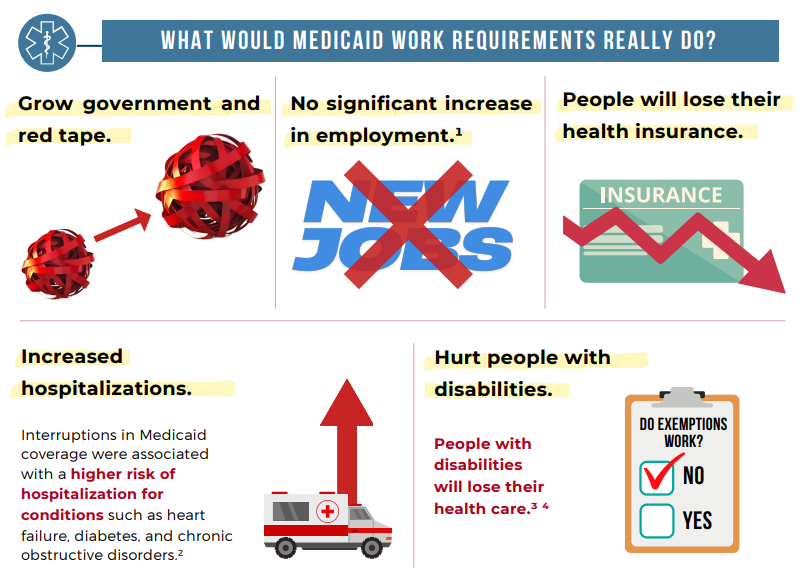Medicaid Cuts Come Into Focus: Millions Stand to Lose Health Care
By Suzanne Wikle
After months of rumors and speculation about how Republicans in Congress will meet their goal of cutting upwards of $880 billion from Medicaid in the next ten years, more specifics about the cuts are coming into focus. Reporting on April 29 indicates the following cuts are likely in the Republican plan:
“Work requirements”
Implementing so-called “work requirements” would change eligibility for certain adults, requiring them to prove employment or other criteria before enrolling. This change in eligibility grows government and red tape, causing a significant increase in paperwork being turned in by applicants and processed by the state; it’s also worth noting that when this has been tried in other programs, the primary results are disenrollment among people who are likely still eligible and no increase in employment.
Adding “work requirements” is one of the most inefficient changes that can be made to Medicaid. The end result will be the risk of lost coverage for up to 36 million people and an increase in both the government’s workload and the cost to process eligibility and applications, while providing no meaningful uptick in employment. If the goal is to strip people of their health insurance by overwhelming them with paperwork requirements, then this will “succeed.” I suspect that is the goal, because the evidence is clear that eligible people will lose their health insurance.
Eliminating eligibility for legal immigrants
Let’s be clear: undocumented immigrants are not eligible for Medicaid that draws down federal funds. Full stop. Not eligible.
A limited group of immigrants in the country legally are eligible. Legal permanent residents eligible for Medicaid usually must wait five years before they can enroll for coverage. Revoking eligibility for green card holders will immediately leave families without access to health coverage, including pregnant women and children.
There is no sugarcoating this—if this eligibility change happens, people will immediately lose their health insurance. This likely includes people working in the care economy, including home health care and child care, and other low-income sectors that support our communities.
Per capita caps
Enacting a per capita cap model would be a drastic financing change to Medicaid. States currently know that the federal government will pay a certain share of Medicaid costs. This model has worked well for 60 years. A per capita cap model would instead give states a set dollar amount per enrollee, and then the states would be responsible for all other costs.
Per capita caps have not been tried in any human service programs.
Creating a radically different financing model for a program the size of Medicaid is incredibly risky. It’s too much, too fast.
About 20 percent of Americans are insured by Medicaid, making it a central part of our entire health care system. Reducing federal dollars to states through per capita caps will shift costs to states, which will be unable to backfill the entire loss of federal funds. States will be left with impossible decisions and are likely to reduce eligibility, cut provider payments, and decrease benefits. The net result is people losing their health care and our entire health care system losing a significant amount of funding, which means hospitals and health care facilities will close, providers will be overburdened, and more people will get sick.
Mandating more frequent eligibility checks
This is another red tape and bureaucratic option. Federal rules already require people to report changes in eligibility such as income or family size, and many states do data checks behind the scenes to monitor eligibility. Mandating more frequent eligibility checks will clog eligibility systems, increase paperwork for state eligibility workers and people insured by Medicaid, and make it more difficult for eligible people to stay enrolled. The data is clear that increasing administrative burdens like this decreases access to programs and disproportionately hurts Black and Hispanic enrollees who are more likely to hold multiple jobs or work in the gig economy, making it even more burdensome to turn in all the right paperwork.
Collectively, these proposed cuts to Medicaid end up “saving” federal dollars because they cut people’s eligibility, increase red tape so it’s too difficult for eligible people to enroll, and shift costs to states. If enacted, the outcome is predictable. People will lose their health insurance, doctors and other providers will see reduced payments, and our entire health care system will suffer.
Share with your network:

